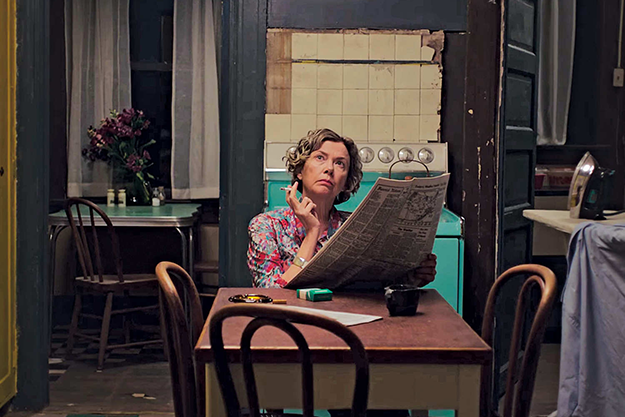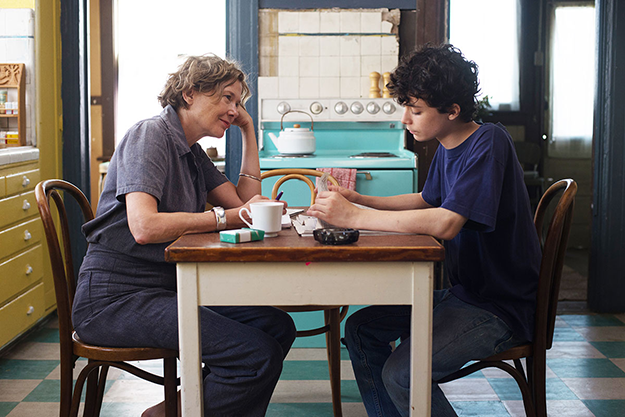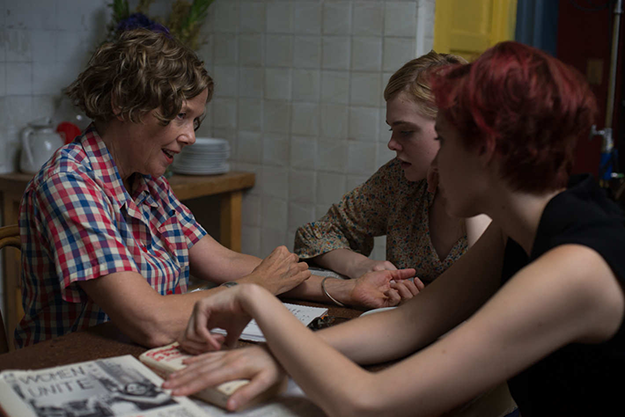Notebook: 20th Century Women

The family car of Dorothea and her teenage son Jamie catches fire in the first scene of Mike Mills’s 20th Century Women. But while the flames engulfing the beat-up Ford Galaxie—a remnant of a long-absent husband and father—are promptly extinguished in a grocery-store parking lot, emotional fires burn steadily throughout the film, across the summer days of those residing in Dorothea (Annette Bening) and Jamie (Lucas Jade Zumann)’s large under-renovation home in 1979 Santa Barbara. Their housemates include two boarders, Abbie (Greta Gerwig), an eccentric punk-haired photographer recovering from cervical cancer and William (Billy Crudup), a hippieish handyman passively searching for meaning, as well as frequent visitor and secret sleepover guest Julie (Elle Fanning), Jamie’s platonic longtime best friend and more sexually experienced crush, who climbs in through his window night after night.
Without the guidance of a conventional narrative structure, these roommates’ assorted interactions provide the basis of this wise and witty film, their relationships unfolding organically, pulsating with the pain and often awkward humor found in the struggle for existence. And even within such a small slice of life, we are not only treated to pieces of the characters’ presents but of their pasts and futures, through voiceovers and brief, moving biographical montages.

Like Richard Linklater’s Boyhood, whose title vexingly excludes the boy’s sister, who was also a vital part of that story, the name 20th Century Women chooses to omit the opposite sex—while featuring robustly imagined men in the form of Jamie and William. In fact, the entire ensemble cast of characters, male and female, are of near-equal significance and the actors who play them are flawless. Yet the film still clearly belongs to Dorothea and Bening, who even in 30 years of too-infrequent, sublime performances, does career-best work here as the independent but lonely 55-year-old single mother, whose every expression, every gesture is honest, revealing, heartbreaking: the way she calls her son “kid”; how she reaches for a cigarette every time an uncomfortable moment arises (she smokes a lot); her body language when attempting to experience what the younger folks do—all speak volumes. “Wondering if you’re happy; it’s just a great short cut to being depressed,” Dorothea tells her son, wiser than his 14 years, when he questions her well-being. Although she’s enlisted Abbie and Julie to help see that her son is raised to be a thoughtful, well-rounded man, at times it seems she’s the one who could use the parenting. She is someone we’d want to know yet fear we can become.
Mills is said to have written the film as a love letter to his mother, who passed away in 1999. And it’s the best tribute any parent could ever be lucky enough to receive. But however personal it may be, Mills’s third and most profound feature is relatable to any viewer. It’s both a coming-of-age and a coming-around-to-aging tale that touches on everyday truths and emotions that are neither forced nor obvious and are all-but absent in the cinema of today. It’s a movie about blood relations and surrogate families, and the tiny moments in life that are more significant than they might seem when they occur. It breathes femininity—unafraid of addressing taboo topics like menstruation and clitoral stimulation—with Abbie using feminist theory as a guiding text for the development of an intrigued and willing Jamie. Coming across one fully fleshed-out woman in a film is rare enough, but to find a trio of them, representing three generations, sharing the same screen feels like something of a miracle.

Hopeful in all its underlying sadness and potential for regret, 20th Century Women is not just a film about and for people of the last century but also of the one we are living in now and of those to come.







